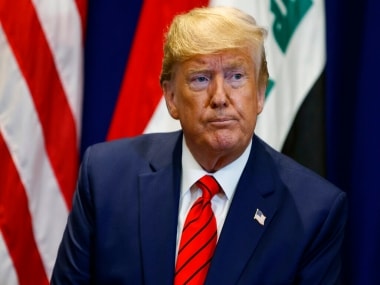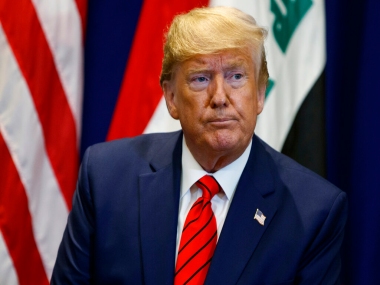Top US Democrat and Speaker Nancy Pelosi on Tuesday announced the opening of a formal impeachment inquiry into President Donald Trump, saying he betrayed his oath of office by seeking help from a foreign power to hurt his probable Democratic rival, Joe Biden. This dramatic move pushes US politics into a risky new chapter, 14 months before the 2020 United States presidential election. “The actions of the Trump presidency revealed the dishonourable facts of the president’s betrayal of his oath of office, betrayal of our national security, and betrayal of the integrity of our elections,” Pelosi told a highly anticipated news conference in Washington. [caption id=“attachment_7397481” align=“alignleft” width=“380”]  File Image of US President Donald Trump. AP[/caption] The inquiry against Trump marks the fourth time in American history when a president faced a viable threat of impeachment. There are only two impeached presidents in United States history, meaning only two presidents have been charged by the House of Representatives with committing “high crimes and misdemeanours.” Donald Trump has joined a small group of fellow presidents now that he’s the subject of an official impeachment inquiry in the House of Representatives. Only three of his predecessors underwent similar proceedings: Andrew Johnson and Bill Clinton, both of whom were acquitted after trials in the Senate, and Richard Nixon, like Trump, had an impeachment process initiated against him. Here’s a look at the all US presidents who have had a formal inquiry filed against them so far. Andrew Johnson Andrew Johnson, was the 17th president of the United States, serving from 1865 to 1869, and his impeachment in 1868 was the culmination of a bitter dispute between the president and the Republican-controlled House over Reconstruction following the Civil War. Johnson was a pro-Union Democrat who had refused to secede from the Soviet Union along with his state, Tennessee, during the war. According to Time Magazine, Johnson was also a racist who favoured a lenient approach to Reconstruction, the process of bringing the states of the Confederacy back into the nation. “Throughout his tenure as president, he clashed with the Congress vetoing bills that he felt were too harsh on the South — including the Freedmen’s Bureau Acts, which gave displaced southerners, including African Americans, access to food, shelter, medical aid and land,” the magazine said. The specific trigger for his impeachment came after Johnson attempted to fire then secretary of war Edwin Stanton, who favoured a tougher approach than Johnson towards the defeated South. Nine of 11 impeachment articles concerned the head of the war department. The House voted to impeach Johnson on 3 March 1868. Three days later, the Senate convened a formal impeachment trial, with Supreme Court Chief Justice Salmon P Chase presiding. On 16 May, after a stormy trial, the Senate failed to convict Johnson on one of the 11 articles, falling short of the necessary two-thirds majority by one vote. After a 10-day recess, two more votes failed by the same margin, and the trial was adjourned. Richard Nixon Richard Nixon was the 37th president of the United States from 1969 until his resignation in 1974. He was the only president to resign from the office in American history. He had previously served as the nation’s 36th vice president from 1953 to 1961 and as a representative and senator from California The House initiated an impeachment process against Nixon on February 1974, authorising the Judiciary Committee to investigate whether grounds existed to impeach him of high crimes and misdemeanours. The charges mostly related to Watergate — shorthand for the 1972 break-in at the Democratic National Committee headquarters and the Nixon administration’s attempts to cover up its involvement. In July 1974, the Judiciary Committee approved three articles of impeachment against Nixon — for obstruction of justice, abuse of power and contempt of Congress. Before the full House could vote on the articles of impeachment, a previously undisclosed audio tape was released that made clear Nixon had a role in the cover-up. He resigned from office on 9 August 1974. Nixon resigned on 8 August 1974 and as per an archived article of The Washington Post, Nixon did not admit to any of the “high crimes and misdemeanours” he was charged with. He had said that he had “put the interests of America first,” and said he no longer had “a strong enough political base in the Congress” for him to be a president. Bill Clinton Bill Clinton served as the 42nd president of the United States from 1993 to 2001 and like Andrew Johson, he had major fallouts with the US Congress all through his term. The two related charges of impeachment against Clinton were specifically lying under oath and obstruction of justice related to the sexual harassment lawsuit brought forth by Paula Jones, and after his affair with former White House intern, Monica Lewinsky became public in January 1998. The Republican-controlled House voted in October 1998 to begin impeachment proceedings against Clinton after months of controversy over his relationship with Lewinsky. That vote was triggered by two rounds of testimony given by Clinton earlier in the year. In January, he denied having a sexual relationship with Lewinsky; in August, under questioning from independent counsel Kenneth Starr before a federal grand jury, he testified that he engaged in an inappropriate relationship with Lewinsky. Clinton was impeached on 19 December 1998, on the grounds of perjury to a grand jury and obstruction of justice. A Senate trial against Clinton commenced on 7 January 1999, and unfolded over four weeks, with Chief Justice William Rehnquist presiding. On 12 February, the Senate voted to acquit Clinton on both charges — falling far short of the 67 votes needed to convict. Only 45 senators voted for conviction on the perjury charge, and 50 for the obstruction charge. Donald Trump Speaker of the United States House of Representatives, Nancy Pelosi recently announced the opening of a formal impeachment inquiry into President Donald Trump, saying he betrayed his oath of office by seeking help from a foreign power to hurt his Democratic rival, Joe Biden. Donald Trump denounced the inquiry as “Witch Hunt garbage” — while also claiming it would help his re-election chances in 2020. “The actions of the Trump presidency revealed the dishonourable facts of the president’s betrayal of his oath of office, betrayal of our national security, and betrayal of the integrity of our elections,” Pelosi told a highly anticipated news conference in the US capital. “Therefore, today I’m announcing the House of Representatives moving forward with an official impeachment inquiry.” The impeachment revelations revolve around a 25 July phone call the president had with Ukrainian President Volodymyr Zelenskiy in which Trump is said to have asked for help investigating Biden and his son Hunter. In the days before the call, Trump ordered advisers to freeze $400 million in military aid for Ukraine, prompting speculation that he was holding up the money as leverage for information on the Bidens. Trump has denied that charge but acknowledged he blocked the funds. With inputs from AP
Top US Democrat and Speaker Nancy Pelosi on Tuesday announced the opening of a formal impeachment inquiry into President Donald Trump
Advertisement
End of Article


)

)
)
)
)
)
)
)
)



